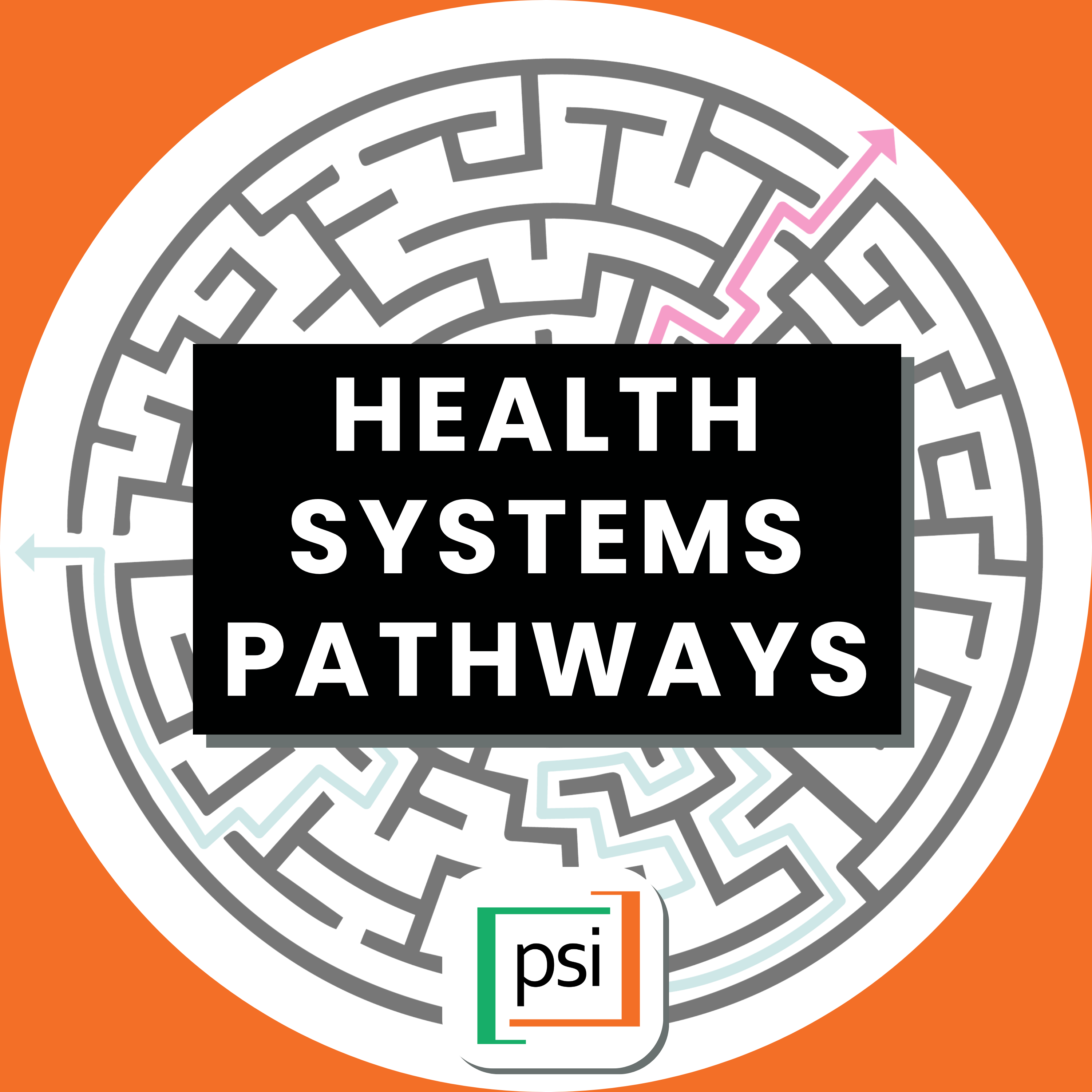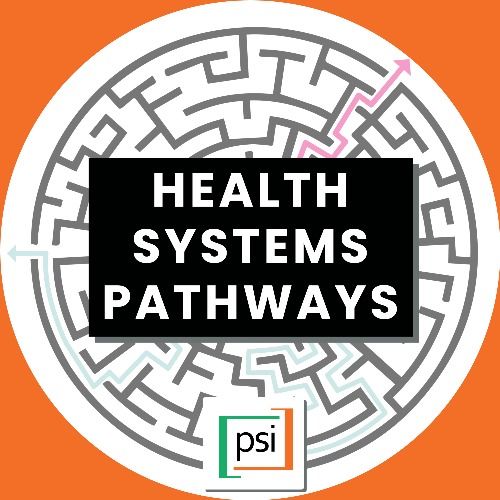Episode 5
Innovating Health Systems: Insights from Health Systems Research 2024
In this episode of Health Systems Pathways, recorded live at the 8th Global Symposium on Health Systems Research in Nagasaki, Alex Ergo dives into transformative strategies for improving global health systems. This episode explores two key themes: how integrated health data systems are driving universal health coverage (UHC) in India and how the private sector can play a pivotal role in strengthening health systems.
Grace Achungura shares insights from India’s innovative approach to health financing, including the use of interoperable digital infrastructure to harmonise insurance schemes and improve service access. Later, Jessica Jones discusses private sector engagement in global health, focusing on unlocking access to financing and aligning public and private health goals.
Discover practical lessons on collaboration, innovation, and keeping consumers at the heart of health system reform.
For more information;
HSS Insights Series: PSI - To access Population Service International's blogs and policy briefs, visit our health systems insights website.
Health Systems Pathways is an SCL Agency Production
Transcript
Hi everyone, and welcome to Health Systems Pathways.
Alex Ergo:This podcast is designed to share insights that inform, inspire, and spark discussions about making health systems easier to navigate in low and middle-income countries.
Alex Ergo:I'm Alex Ergo, PSI's Director of Health Systems, and I'm thrilled to bring you this special episode recorded live at the Health Systems Research Symposium in Nagasaki.
Alex Ergo:The theme of the conference this year resonates really well with the work we do at PSI.
Alex Ergo:Our focus is on building health systems that meet people's needs now and in the future.
Alex Ergo:That means addressing challenges like integrating health data, understanding consumer needs, advancing self-care, engaging the private sector, and tackling the complex links between climate and health.
Alex Ergo:In this episode, we'll dive into two of these critical areas.
Alex Ergo:First, we'll explore how integrated health data systems are helping improve health financing and advance universal health coverage in India.
Alex Ergo:Then we'll discuss how better collaboration between the public and private sectors can strengthen health systems and improve outcomes for everyone.
Alex Ergo:These are real world strategies that show how health systems can become more resilient, equitable and responsive.
Alex Ergo:So, let's get straight into the conversations.
Alex Ergo:I'm now with Grace Achungura and she will talk about a publication that she just presented about at a recent session at the Health Systems Research Symposium in Nagasaki.
Grace Achungura:Hi Alex, nice to meet you.
Grace Achungura:I'm Grace Achungura.
Grace Achungura:So, I and a couple of colleagues, we did an article on Objectives Oriented Health Systems Research.
Grace Achungura:It's a supplement that brings together experiences from about 12 countries.
Grace Achungura:So, India is one of those.
Grace Achungura:For the Indian case study, we are looking at the role that integrated digital infrastructure can play in furthering UHC.
Grace Achungura:Objectives and goals and how that has played out in India.
Alex Ergo:Would you mind to clarify what you mean by objective oriented health system reform?
Alex Ergo:Because this was the focus of the session, but not everyone may be familiar with this term.
Alex Ergo:So can you very briefly explain what that means?
Grace Achungura:Objective oriented health system reform is really trying to get policymakers to think about the ends versus the means.
Grace Achungura:When determining the direction for policy.
Grace Achungura:So usually what happens is that um, When a policy window opens for reform, We tend to run to the solution.
Grace Achungura:Oh, we need health insurance.
Grace Achungura:Oh, we need performance based financing.
Grace Achungura:Oh, we need to, to DRGs for instance, Diagnosis Related Groups, Without necessarily thinking about, What is the problem?
Grace Achungura:What?
Grace Achungura:Where do we want to go in terms of the objectives of the reform?
Grace Achungura:And then once you have clarified what your current situation is, where you want to go, then coming back to the drawing board and saying, what are the best tools to fit this solution?
Grace Achungura:And as the Indian case study will show, it may not necessarily be the usual suspect.
Grace Achungura:That is the best tool in that situation.
Grace Achungura:It might be something that is further out of your field that actually provides you a solution to addressing the challenge that is at hand.
Alex Ergo:Yeah, that's a great point.
Alex Ergo:I think far too often we come already with a solution to the table, even before we understand what the real problem is.
Alex Ergo:Now could you just tell us a few words about the article that you presented and that you co-wrote about basically trying to address some fragmentation in the, the data systems in India and how that interoperability has basically helped advance the health financing reforms.
Alex Ergo:Can you say a few words about, about that?
Grace Achungura:So, as you know, in 2018, the government of India introduced a public reform on health insurance.
Grace Achungura:So they moved from RSBY.
Grace Achungura:Which was the erstwhile scheme for the poor and the vulnerable to the Prime Minister's scheme, PMJ, covering about 5 million households.
Grace Achungura:And so, as part of that reform, the government working together across different ministries, including ICT, Ministry of Health, the National Planning Think Tank, also bringing on board the state governments and some of their experiences, came up with an integrated information system that learned a lot from the previous experience with RSBY where yes, they had fragmented systems that were largely managed by the states and the insurance companies, but they picked up lessons from that on how to do things better this time around.
Grace Achungura:They adopted also one of the state scheme's ICT systems that was doing a bit better than the others, as well as also piggybacking on some of the broader government reforms, particularly around interoperability between the beneficiary management systems, the claims management systems, the grievance, reduced systems, building interoperability between those to enable them have one system that not only handles the beneficiary management, but also handles the selective contracting for providers, as well as managing the claims and fraud.
Grace Achungura:With that system, this was then rolled out to the states and union territories that were involved in PMJ.
Grace Achungura:That has done a lot, has had important dividends in terms of a UHC standpoint, it has helped in merging the pools together in some states.
Grace Achungura:So in some states where they were unable to match the pools, they've at least used that system as a basis for harmonizing, um, some of the schemes in terms of for instance, reducing overlaps between different schemes, in terms of the population groups, but also gaps in service coverage to ensure that at least they have similar benefit packages.
Grace Achungura:A state like Hassan is an example.
Grace Achungura:In others they've used it to partially merge schemes and in others still they've used it to fully integrate schemes into one.
Grace Achungura:So, that way now you've you're able to have one populace all having the same benefits across the board that is equitable.
Grace Achungura:At a national level.
Grace Achungura:It has also enabled them to ensure portability of benefits across states.
Grace Achungura:So there are some states, of course, that are economically less advantaged than others.
Grace Achungura:And so when it comes to service coverage, they may be limited, particularly for high cost tertiary and care, super specialty care.
Grace Achungura:So what happens is that with the portability that is built within the system, a patient from a disadvantaged state can go and seek care in a different state, which, of course, has more resources and the hospital in the advantaged state is reimbursed seamlessly because they have one transaction management system.
Grace Achungura:Also, it has helped improve operational efficiency.
Grace Achungura:We see much faster claims processing much faster beneficiary identification.
Grace Achungura:It has reduced inclusion and exclusion errors.
Grace Achungura:It has also helped a lot with the selective contracting, made it a little bit more transparent.
Grace Achungura:So, with RSBY, you had more of the private sector coming on, but this time around you're having a little bit more parity um, moreover, with the public also, I think having more of a share than the private.
Grace Achungura:So there are some lessons to learn that really you don't have to always run with the health financing tool.
Grace Achungura:I think sometimes the solution might lie outside of the health financing subsystems.
Grace Achungura:So to speak in this case, it's an information system that is usually the purview of the digital health expert.
Grace Achungura:But if the health financing or health economists come up with the digital specialist in their country piggybacking on broader government reform.
Grace Achungura:I think the health information system is a good entry point for strengthening the system, cementing not only the information system but the health financing landscape to enable us to achieve UHC goals.
Alex Ergo:Well, that's an excellent example of basically trying to harmonize and trying to bring together the different pools in some way and, and improve financial protection, but also improve efficiency in a big way.
Alex Ergo:Do you already have any numbers that show the efficiency gains that have been realized by this experience.
Grace Achungura:So previously, for instance, pre-authorization would sometimes take days with RSBY, but here you can see on average, most of the states are just under the turnaround time that is the target.
Grace Achungura:So what we have is 5.
Grace Achungura:8 hours on average pan India within 5.
Grace Achungura:8 hours.
Grace Achungura:Most states have preauthorized a patient to receive care.
Grace Achungura:Well, the target is six hours and that's even better than what we have with CMS and Medicaid in the US.
Grace Achungura:So you can see that already in terms of operational efficiency, there are some dividends.
Grace Achungura:When it comes to portability, you can see at least from around 2018, Almost 2 to 4 percent of all cases in India are portability cases.
Grace Achungura:And I can tell you that this is a really, really big advantage, especially for cases that require transplantation, that require cardiac surgery.
Grace Achungura:Some of these states do not have the capacity to do so.
Grace Achungura:So when you can see patients reporting back and saying, I was able to have this transplant for free, and yet the state does not offer that.
Grace Achungura:That's a big thing, Alex.
Alex Ergo:So that's a major achievement.
Alex Ergo:And I imagine that also leads to great satisfaction both among the patients or among the enrolled population and among the providers, right?
Grace Achungura:Yes, it is.
Grace Achungura:The providers do appreciate it.
Grace Achungura:Most of the providers that we've interviewed for other research purposes, have appreciated the scheme and the changes that have happened.
Grace Achungura:Of course, there are growing pains that can happen with any new system, but overall, I think there's been much better satisfaction given these changes.
Alex Ergo:Well, thank you so much for sharing that.
Alex Ergo:It was a great session and really a great example that you just shared with us.
Alex Ergo:So thank you so much and hope you enjoy the rest of the conference.
Alex Ergo:I'm now with Jessica Jones.
Alex Ergo:Jessica is Technical Advisor on Frontier Health Markets Engage.
Alex Ergo:You had a session already this morning.
Alex Ergo:Would you mind just sharing your first impressions?
Jessica Jones:First impressions of the session this morning, which was on, uh, changing incentives for engaging the private sector in global health.
Jessica Jones:I'm really encouraged by how many people were interested in coming to a very early first day satellite session on the private sector.
Jessica Jones:For those of us who've been working in the private sector a long time, we know that there's always been a role for the private sector in global public health, but I do feel like the dialogue on the role of the private sector in global public health in health systems conversation is changing and that there's increasing interest in and energy around conversations about engaging the private sector as well as a recognition of the really important role of the private sector not only could play but already does play in global public health.
Alex Ergo:Great, and if I'm not mistaken, in your first session, you talked about private sectors access to financing so that they can invest in their business.
Alex Ergo:What do you think could be incentives for private providers to make sure that these investments in their business also benefit the wider system, so are better aligned with the public health goals.
Jessica Jones:One of the topics that we talked about quite a bit in the session this morning was whether or not we even need to go for that shared alignment between the private sector and the public sector in terms of bringing the private sector into public health goals.
Jessica Jones:The private sector has already a mandate and incentives around providing a public health a service that individuals or governments will pay for and differentiating themselves based on quality or access or range of services.
Jessica Jones:And so by providing access to affordable finance, we are unlocking the potential of the private sector to grow into a role where they can meet those needs that are already there.
Jessica Jones:We've really focused on FHM Engage on being that facilitator of access to finance, of working with these private sector businesses to understand what their needs are to access available financing, understand what supportive services or shared technology transfer that they might need to be able to be eligible to access financing, as well as working with financers to help demystify the health sector and make that worth their while.
Jessica Jones:We have not spent a lot of time on monitoring what happens to the funding afterwards.
Jessica Jones:Um, we are of course paying attention, but we really hope by aligning those upfront incentives um, between the private health providers and the financers that we're already working towards shared public health goals.
Alex Ergo:And that's great.
Alex Ergo:And what do you feel about the stewardship of private providers?
Alex Ergo:What do you think should be done more of to improve it and to make sure that private and public sector are better integrated in the longer term?
Jessica Jones:So, two immediate reactions to that.
Jessica Jones:I think one, of course, it entirely depends on the country.
Jessica Jones:Models of stewardship and private sector governance are very different across different country contexts and it's important to go in with an understanding of what's already in place.
Jessica Jones:And what has been tried to engage the private sector and where that's working, and if it hasn't worked, why it hasn't worked.
Jessica Jones:The other thing I would push back on a little bit is we had a conversation as part of our session this morning about that governance and stewardship of the private sector shouldn't be a separate issue.
Jessica Jones:It's not a separate endeavor, but rather that we have been doing governance and stewardship all along of the public sector and it's more about involving the private sector as part of the overall health system rather than treating it as a separate entity to be governed.
Jessica Jones:And so it's really that holistic look at the health system overall and making sure that the public and private sectors are effectively stewarded by the government.
Alex Ergo:Just a follow up question on that.
Alex Ergo:Do you feel that they are already engaged in those discussions or do you think that more could be done?
Alex Ergo:And if so, how?
Jessica Jones:Again, it entirely depends on the country.
Jessica Jones:I would say in more cases than not, um, there is definitely room for improvement.
Jessica Jones:And one of the biggest takeaways that I have from this is that there has been a lot of thinking in global public health about how to engage the private sector in the sense of bring the private sector to the public sector and not a whole lot of thinking about what the private sector actually needs to want to be engaged in the first place.
Jessica Jones:And so there's been a lot of efforts in technical working groups where there's a private sector seat and sometimes they come and sometimes they don't.
Jessica Jones:But a lot less in communicating that shared value proposition of what is in it for the private sector and why would it make a business case for them to be stewarded in the first place.
Jessica Jones:And so more of that thinking from the private sector perspective about how we can make this a shared value conversation and worth everybody's while is I think what we could do a lot better at.
Alex Ergo:Well, a big thank you to Grace and Jessica for sharing their insights.
Alex Ergo:I hope these two conversations gave you a flavor of what we're learning here in Nagasaki.
Alex Ergo:They both touched on how health systems are being transformed from using integrated data systems to improve health financing, to engaging private sector actors as equal partners in health system governance, and they both also underscore the importance of collaboration of innovation and keeping the consumer at the center of it all.
Alex Ergo:So, thank you for tuning into Health Systems Pathways.
Alex Ergo:I hope you enjoyed this episode.
Alex Ergo:If you did, please subscribe or follow us wherever you get your podcasts so you don't miss the next episodes.
Alex Ergo:Until next time, I'm Alex Ergo, so let's keep working together to build stronger health systems that work for people.




